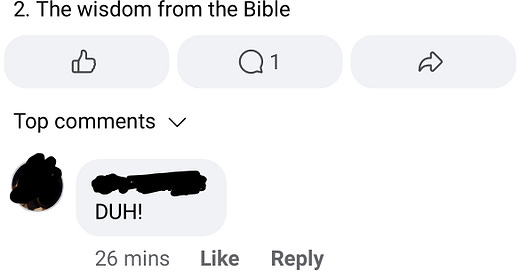Sometimes I can’t control myself. I see a post in a forum that demands my response. I’ll type out a lengthy paragraph along with a source or two, and then I’ll delete everything I wrote, close the tab, and try to distract myself with something else until my outrage, confusion, or bewilderment dies down.
Other times, I’ll hit submit only to quickly delete my response before the sharks smell blood.
On occasion, and by far my most rare response these days, I’ll hit submit and let it sit there in the replies waiting to be devoured by the Guardians of Truth.
This time, I chose to screenshot the question, stick it in my ideas for articles, and now I’ll submit my response to you instead of the Facebook watchdogs.
“Which one is good?
1. To follow the wisdom from academic scholars
2. The wisdom from the Bible”
First, we might change the question to “Which is better?” or we might even take it in the sense of the ruler who called Jesus “good” (Luke 18:18ff). But regardless of how we might word it or imagine the author’s original intention, I think we all know what is meant by this…and as one commenter said, “DUH!”
Some people follow religious scholars to the exclusion of the wisdom of the Bible—we don’t, of course, but some people do.
And so one might ask this question to get the obvious answer: “I follow the wisdom of the Bible over any religious scholar!”
And after their profile is searched for potential unlawful church affiliations or certain posts or reposts that suggest heresy, the next question might be, “Then why did you post such and such post or follow such and such person or attend such and such church? You claim to follow the Bible, but one couldn’t tell from your Facebook wall!”
This is basically the setup and trap of many Bible study tracts and evangelism courses. Get them to admit that they’ll follow the Bible no matter what then hold their feet to the fire as you take advantage of their ignorance while you fly through passages at breakneck speed, all while tearing down the things they were taught to believe.
But this question reveals a dichotomy that is all too common in many Christian circles. We have to choose between scholars and the Bible.
But this logic runs into a few different problems. First of all, there are things in the Bible that are hard to understand. There are different genres, complex arguments, and even certain vocabulary words that simply require extrabiblical tools such as lexicons/ dictionaries, concordances, and even commentaries or resources on the cultural background of the text.
But the most obvious problem is that we would not have a Bible we could read if it weren't for at least one group of scholars who were proficient enough in the original languages to accurately and reliably translate the texts into something you and I could read.
But not only that, we depend upon archeologists, historians, anthropologists, and other specialists to even produce the manuscripts we have, check them against other authorities, and compile them into a document that most accurately reflects the original autographs that have been lost to history which must then be translated.
Without the wisdom of the scholars, we would not have access to the wisdom of the Bible.
They provide us with the manuscripts which must be translated, published, and distributed. And then, we still need tools to be able to interpret the true meaning of these sacred writings. While the wisdom which comes from above may trump the wisdom of any human, the Bible is inaccessible apart from the community of believers and the activities of theologians and historians who were enabled by God to preserve and make the Bible available to us.
So, which is it? The wisdom of scholars or the wisdom of the Bible?
We don’t have to choose. They are both good and needed.
And if you disagree…then please ask your Bible class teachers and ministers to simply read passages from Scripture without their commentary. Because unless they are infallible or at least highly educated, they are most likely offering at least some thoughts that have been debated and maybe even disproven by competent and godly scholars since the beginning of the church.






I read "Which one is good?" and a picture popped into my mind of a hunter in the woods laying a trap.